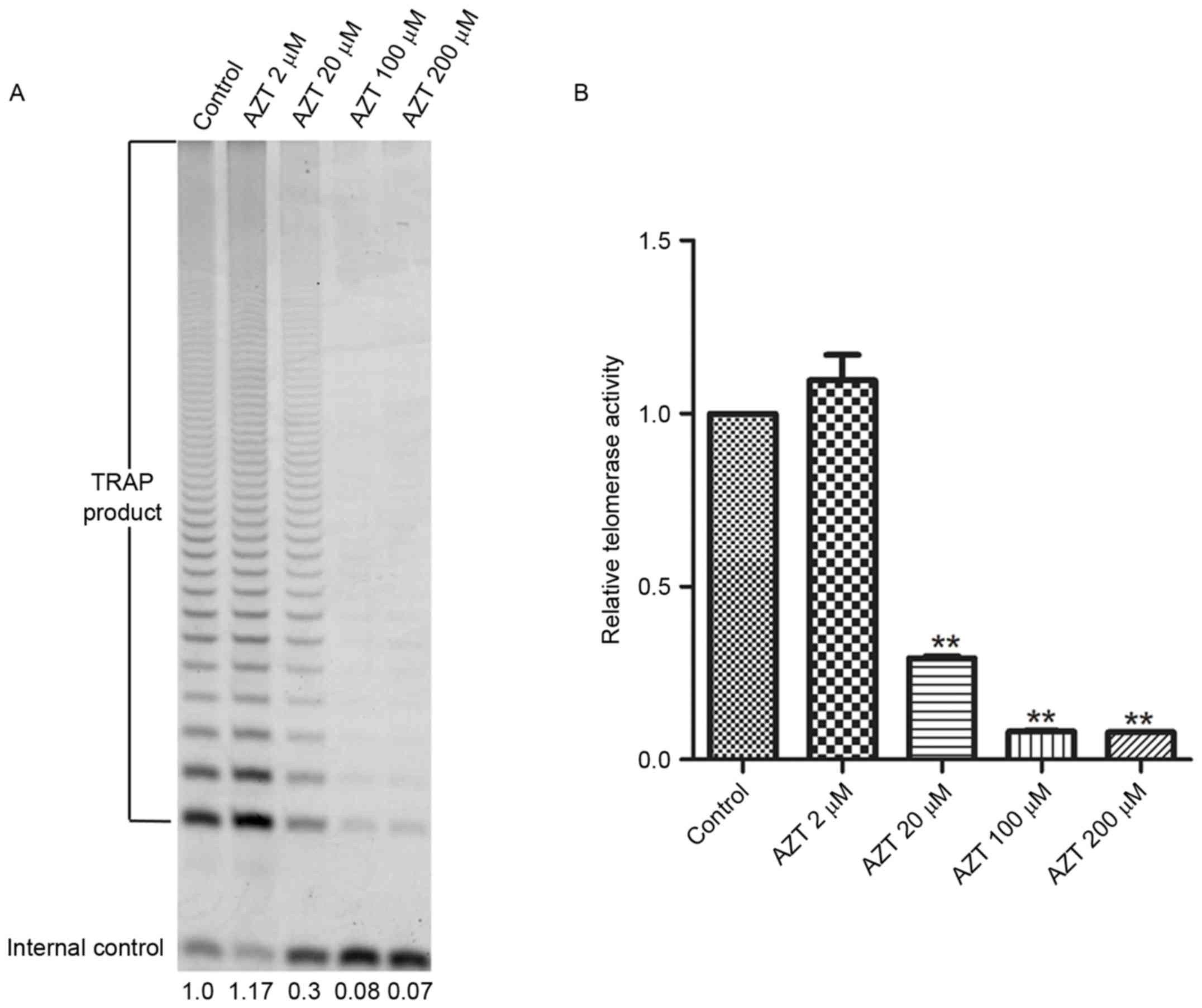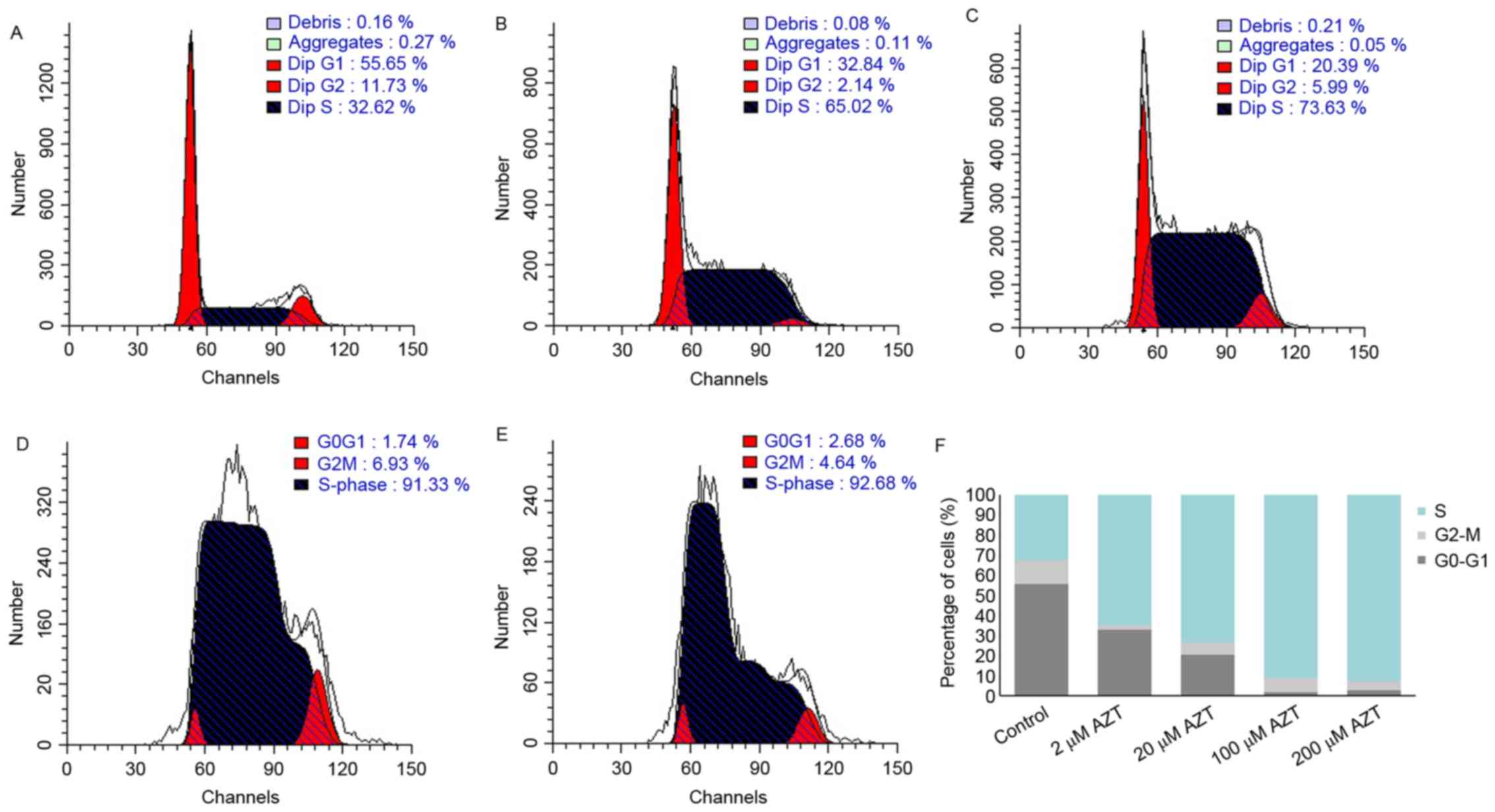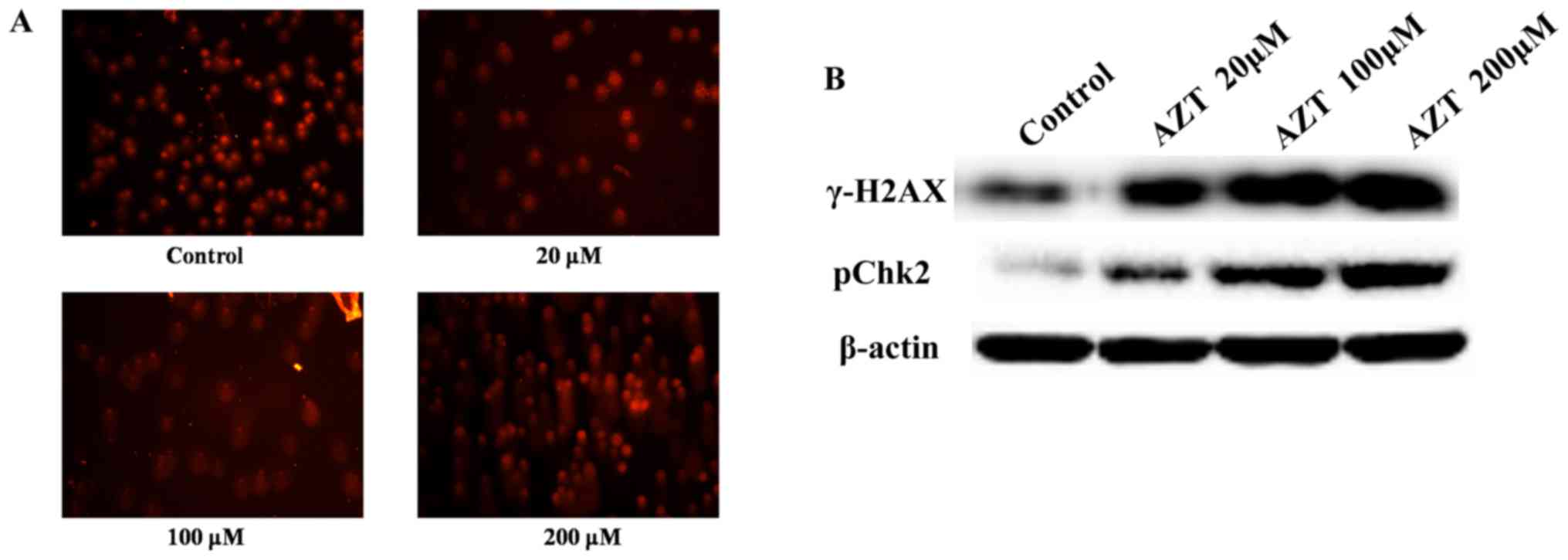|
1
|
Blackburn EH: Telomerases. Annu Rev
Biochem. 61:113–129. 1992. View Article : Google Scholar
|
|
2
|
Urquidi V, Tarin D and Goodison S: Role of
telomerase in cell senescence and oncogenesis. Ann Rev Med.
51:65–79. 2000. View Article : Google Scholar
|
|
3
|
Kim NW, Piatyszek MA, Prowse KR, Harley
CB, West MD, Ho PL, Coviello GM, Wright WE, Weinrich SL and Shay
JW: Specific association of human telomerase activity with immortal
cells and cancer. Science. 266:2011–2015. 1994. View Article : Google Scholar
|
|
4
|
Pal J, Gold JS, Munshi NC and Shammas MA:
Biology of telomeres: Importance in etiology of esophageal cancer
and as therapeutic target. Transl Res. 162:364–370. 2013.
View Article : Google Scholar
|
|
5
|
Li C, Wu MY, Liang YR and Wu XY:
Correlation between expression of human telomerase subunits and
telomerase activity in esophageal squamous cell carcinoma. World J
Gastroenterol. 9:2395–2399. 2003.
|
|
6
|
Mao WM, Zheng WH and Ling ZQ:
Epidemiologic risk factors for esophageal cancer development. Asian
Pac J Cancer Prev. 12:2461–2466. 2011.
|
|
7
|
Torre LA, Bray F, Siegel RL, Ferlay J,
Lortet-Tieulent J and Jemal A: Global cancer statistics, 2012. CA
Cancer J Clin. 65:87–108. 2015. View Article : Google Scholar
|
|
8
|
Lin Y, Totsuka Y, He Y, Kikuchi S, Qiao Y,
Ueda J, Wei W, Inoue M and Tanaka H: Epidemiology of esophageal
cancer in Japan and China. J Epidemiol. 23:233–242. 2013.
View Article : Google Scholar :
|
|
9
|
Napier KJ, Scheerer M and Misra S:
Esophageal cancer: A review of epidemiology, pathogenesis, staging
workup and treatment modalities. World J Gastrointest Oncol.
6:112–120. 2014. View Article : Google Scholar :
|
|
10
|
Gomez DE, Armando RG and Alonso DF: AZT as
a telomerase inhibitor. Front Oncol. 2:1132012. View Article : Google Scholar :
|
|
11
|
Ji HJ, Rha SY, Jeung HC, Yang SH, An SW
and Chung HC: Cyclic induction of senescence with intermittent AZT
treatment accelerates both apoptosis and telomere loss. Breast
Cancer Res Treat. 93:227–236. 2005. View Article : Google Scholar
|
|
12
|
Li H, Song T, Xu W, Yu Y, Xin X and Hui D:
Effect of 3′-Azido-3′-deoxythymidine (AZT) on telomerase activity
and proliferation of HO-8910 cell line of ovarian cancer. Int J
Biomed Sci. 2:34–40. 2006.
|
|
13
|
Sun YQ, Guo TK, Xi YM, Chen C, Wang J and
Wang ZR: Effects of AZT and RNA-protein complex (FA-2-b-beta)
extracted from Liang Jin mushroom on apoptosis of gastric cancer
cells. World J Gastroenterol. 13:4185–4191. 2007. View Article : Google Scholar :
|
|
14
|
Fang JL and Beland FA: Long-term exposure
to zidovudine delays cell cycle progression, induces apoptosis, and
decreases telomerase activity in human hepatocytes. Toxicol Sci.
111:120–130. 2009. View Article : Google Scholar :
|
|
15
|
Falchetti A, Franchi A, Bordi C, Mavilia
C, Masi L, Cioppi F, Recenti R, Picariello L, Marini F, Del Monte
F, et al: Azidothymidine induces apoptosis and inhibits cell growth
and telomerase activity of human parathyroid cancer cells in
culture. J Bone Miner Res. 20:410–418. 2005. View Article : Google Scholar
|
|
16
|
Pressacco J and Erlichman C: Combination
studies with 3′-azido-3′-deoxythymidine (AZT) plus ICI D1694.
Cytotoxic and biochemical effects. Biochem Pharmacol. 46:1989–1997.
1993. View Article : Google Scholar
|
|
17
|
Bröker LE, Kruyt FA and Giaccone G: Cell
death independent of caspases: A review. Clin Cancer Res.
11:3155–3162. 2005. View Article : Google Scholar
|
|
18
|
Terali K and Yilmazer A: New surprises
from an old favourite: The emergence of telomerase as a key player
in the regulation of cancer stemness. Biochimie. 121:170–178. 2016.
View Article : Google Scholar
|
|
19
|
Yu HP, Xu SQ, Lu WH, Li YY, Li F, Wang XL
and Su YH: Telomerase activity and expression of telomerase genes
in squamous dysplasia and squamous cell carcinoma of the esophagus.
J Surg Oncol. 86:99–104. 2004. View Article : Google Scholar
|
|
20
|
Shay JW and Wright WE: Telomerase: A
target for cancer therapeutics. Cancer Cell. 2:257–265. 2002.
View Article : Google Scholar
|
|
21
|
Zvereva MI, Zatsepin TS, Azhibek DM,
Shubernetskaya OS, Shpanchenko OV and Dontsova OA: Oligonucleotide
inhibitors of telomerase: Prospects for anticancer therapy and
diagnostics. Biochemistry (Mosc). 80:251–259. 2015. View Article : Google Scholar
|
|
22
|
Datta A, Bellon M, Sinha-Datta U,
Bazarbachi A, Lepelletier Y, Canioni D, Waldmann TA, Hermine O and
Nicot C: Persistent inhibition of telomerase reprograms adult
T-cell leukemia to p53-dependent senescence. Blood. 108:1021–1029.
2006. View Article : Google Scholar :
|
|
23
|
Posner MR, Darnowski JW, Weitberg AB,
Dudley MN, Corvese D, Cummings FJ, Clark J, Murray C, Clendennin N,
Bigley J, et al: High-dose intravenous zidovudine with
5-fluorouracil and leucovorin. A phase I trial. Cancer.
70:2929–2934. 1992. View Article : Google Scholar
|
|
24
|
Marchbanks K, Dudley MN, Posner MR and
Darnowski J: Pharmacokinetics and pharmacodynamics of high-dose
zidovudine administered as a continuous infusion in patients with
cancer. Pharmacotherapy. 15:451–457. 1995.
|
|
25
|
Clark J, Sikov W, Cummings F, Browne M,
Akerley W, Wanebo H, Weitberg A, Kennedy T, Cole B, Bigley J, et
al: Phase II study of 5-fluoruracil leucovorin and azidothymidine
in patients with metastatic colorectal cancer. J Cancer Res Clin
Oncol. 122:554–558. 1996. View Article : Google Scholar
|
|
26
|
Miller KD, Loehrer PJ, Gonin R, Weber G,
Ansari R, Pletcher W, McClean J, Spiridonidis CH and Mortimer J: A
phase II study of weekly oral methotrexate and zidovudine (AZT) in
advanced adenocarcinoma of the pancreas and hepatocellular
carcinoma. Invest New Drugs. 14:207–212. 1996. View Article : Google Scholar
|
|
27
|
Falcone A, Lencioni M, Brunetti I, Pfanner
E, Allegrini G, Antonuzzo A, Andreuccetti M, Malvaldi G, Danesi R,
Del Tacca M and Conte PF: Maximum tolerable doses of intravenous
zidovudine in combination with 5-fluorouracil and leucovorin in
metastatic colorectal cancer patients. Clinical evidence of
significant antitumor activity and enhancement of
zidovudine-induced DNA single strand breaks in peripheral nuclear
blood cells. Ann Oncol. 8:539–545. 1997. View Article : Google Scholar
|
|
28
|
Lin SH and Chang JY: Esophageal cancer:
Diagnosis and management. Chin J Cancer. 29:843–854. 2010.
View Article : Google Scholar
|
|
29
|
Fang JL, McGarrity LJ and Beland FA:
Interference of cell cycle progression by zidovudine and lamivudine
in NIH 3T3 cells. Mutagenesis. 24:133–141. 2009. View Article : Google Scholar
|
|
30
|
Sun L and Wang X: Effects of allicin on
both telomerase activity and apoptosis in gastric cancer SGC-7901
cells. World J Gastroenterol. 9:1930–1934. 2003. View Article : Google Scholar :
|
|
31
|
Zhou FX, Liao ZK, Dai J, Xiong J, Xie CH,
Luo ZG, Liu SQ and Zhou YF: Radiosensitization effect of zidovudine
on human malignant glioma cells. Biochem Biophys Res Commun.
354:351–356. 2007. View Article : Google Scholar
|
|
32
|
Nugent CI, Bosco G, Ross LO, Evans SK,
Salinger AP, Moore JK, Haber JE and Lundblad V: Telomere
maintenance is dependent on activities required for end repair of
double-strand breaks. Curr Biol. 8:657–660. 1998. View Article : Google Scholar
|
|
33
|
Oka K, Tanaka T, Enoki T, Yoshimura K,
Ohshima M, Kubo M, Murakami T, Gondou T, Minami Y, Takemoto Y, et
al: DNA damage signaling is activated during cancer progression in
human colorectal carcinoma. Cancer Biol Ther. 9:246–252. 2010.
View Article : Google Scholar :
|
|
34
|
Chen Z and Corey DR: Telomerase
inhibitors: A new option for chemotherapy. Adv Cancer Res.
87:31–58. 2003. View Article : Google Scholar
|
|
35
|
Chen C, Zhang Y, Wang Y, Huang D, Xi Y and
Qi Y: Synergic effect of 3′-azido-3′-deoxythymidine and arsenic
trioxide in suppressing hepatoma cells. Anticancer Drugs.
22:435–443. 2011. View Article : Google Scholar
|
|
36
|
Mattson DM, Ahmad IM, Dayal D, Parsons AD,
Aykin-Burns N, Li L, Orcutt KP, Spitz DR, Dornfeld KJ and Simons
AL: Cisplatin combined with zidovudine enhances cytotoxicity and
oxidative stress in human head and neck cancer cells via a
thiol-dependent mechanism. Free Radic Biol Med. 46:232–237. 2009.
View Article : Google Scholar
|


















